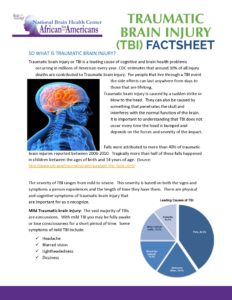So what is traumatic brain injury?
 Traumatic brain injury or TBI is a leading cause of cognitive and brain health problems occurring in millions of American every year. CDC estimates that around 30% of all injury deaths are contributed to Traumatic brain injury. For people that live through a TBI event the side effects can last anywhere from days to those that are lifelong.
Traumatic brain injury or TBI is a leading cause of cognitive and brain health problems occurring in millions of American every year. CDC estimates that around 30% of all injury deaths are contributed to Traumatic brain injury. For people that live through a TBI event the side effects can last anywhere from days to those that are lifelong.
Traumatic brain injury is caused by a sudden strike or blow to the head. They can also be caused by something that penetrates the skull and interferes with the normal function of the brain. It is important to understanding that TBI does not occur every time the head is bumped and depends on the forces and severity of the impact.
Falls were attributed to more than 40% of traumatic brain injuries reported between 2006-2010. Tragically more than half of these falls happened in children between the ages of birth and 14 years of age. (Source: http://www.cdc.gov/traumaticbraininjury/get_the_facts.html)
The severity of TBI ranges from mild to severe. This severity is based on both the signs and symptoms a person experiences and the length of time they have them. There are physical and cognitive symptoms of traumatic brain injury that are important for us o recognize.
Mild Traumatic brain injury: The vast majority of TBIs are concussions. With mild TBI you may be fully awake or lose consciousness for a short period of time. Some symptoms of mild TBI include:
- Headache
- Blurred vision
- Lightheadedness
- Dizziness
- Ringing in your ears
One of the major concerns with mild traumatic brain injuries like concussions is that over time if the injury is repeated or sustained the risk for other brain health issues like epilepsy and Alzheimer’s disease increased.
Moderate to Severe Traumatic Brain Injury: For persons that suffers from moderate to severe TBI they duration and impact of the symptoms are more significant. These injuries require immediate medical attention and can be difficult to treat and manage. Someone with a moderate to severe traumatic brain injury may experience the following:
- Same symptoms as mild TBI but headaches may get worse
- Problems speaking
- Bleeding or spinal fluid from the ears and/or nose
- Temporary or permanent paralysis
- Problems with memory and cognition
- Behavior and mood changes
Impact of Traumatic Brain Injury in the African-American
In the United States approximately 1.7 million people suffer from some type of traumatic brain injury. African-Americans have the highest rates for brain injury than any other ethnicity. African-American men are 1.5 times more likely to have a TBI than women. This also means that more African-Americans are dying at greater rates from traumatic brain injuries. The impact of TBI on the African-American community also involves the caregivers and family members of those caring for and supporting those with the brain injury. The effects of traumatic brain injury are disproportionately experienced in the African-American community financially, physically, and emotionally.
How can you prevent traumatic brain injuries?
In most cases there is not much that can be done to correct or repair the damage that is done to the brain from traumatic brain injuries so prevention is important to not only save lives but to keep our children and loved ones safe.
We all should be physically active and continue doing the things in life we enjoy for both work and play. The help prevent traumatic brain injuries try to do the following:
- Always wear your seat belt and use proper restraints for your children while driving
- Always wear a helmet or appropriate protective gear when playing sports or doing activities where blows or impacts to the head could happen. This includes when you are on your motorcycle, bicycle, and water sports
- When at work or outside be sure to check your surroundings for potential hazards and remove them
- Don’t drive or work with heavy machines while under the influence of medications, alcohol, or other substances that might alter your brain function
How do you treat and care for those with a traumatic brain injury?
It is important to know and recognize the signs and symptoms of traumatic brain injury to get immediate medical attention as the initial damage done to the brain may not be corrected and the longer the brain is injured the more significant and life threatening the damage can be. Medical professionals can use a combination of visual assessments, what they persons says they are experiencing, and some imaging technologies like x-rays and MRIs of the brain to determine the occurrence and extent of a traumatic brain injury. Treatment for the injury is aimed at correcting if possible any damage done to the brain and to address the signs and symptoms a persons is having. For mild types of TBI a period a rest and recovery for the person is recommended. This means limited both physical and cognitive activities such as reading for a period time as instructed by your provider. For more severe forms of traumatic brain injury the following treatments may be used to help improve or manage overall brain function and health:
- Surgical treatments
- Medications to reduce swelling in the brain that may have occurred
- Rehabilitation treatments to restore physical strength and function lost due to the TBI
- Behavioral and psychological treatments
Additonal resources
National Institute for Neurological Disorders and Stroke http://www.ninds.nih.gov/disorders/tbi/tbi.htm
The Centers for Disease Control and Prevention, Injury Prevention & Control –
